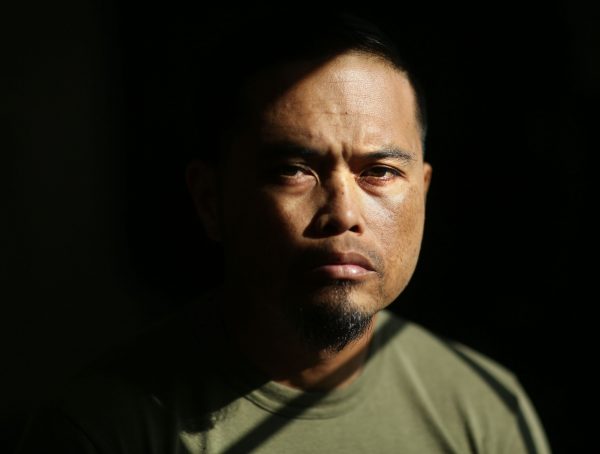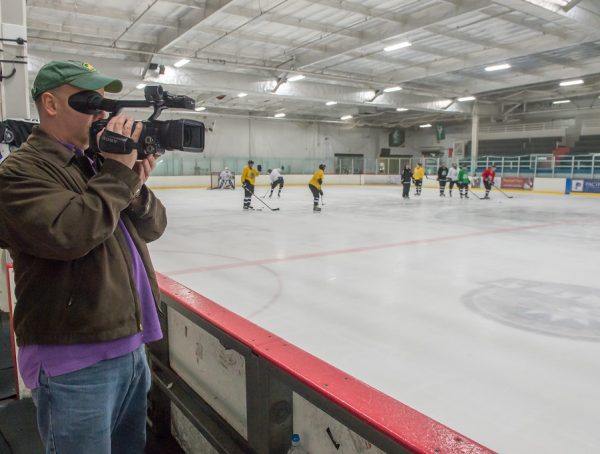Aubrey Aden-Buie is the program director at Glassbreaker Films, which aims to uplift the next generation of female documentary filmmakers. Aden-Buie also directs BridgeUP: FILM, a program she created to teach high school women about video production, reporting and storytelling. She, along with three other team members, produced more than 20 short films that received accolades including an Emmy nomination, an Edward R. Murrow Award and a Vimeo Staff Pick. Aden-Buie’s work has been published by the New Yorker, PBS Newshour, The Center for Investigative Reporting, The New York Times, Sports Illustrated, Special Olympics, Mashable, Fox Sports, NPR and more. She recently was interviewed at the Atlanta Photojournalism Seminar by Sarah Liese, a student in the University of Mississippi School of Journalism and New Media.
Q: At what point did you decide you wanted to be a journalist? And then, when did you decide that you wanted to make documentaries?
A: I decided I wanted to be a journalist when I was 25. I went back to school for broadcast journalism. But when it came to documentaries, we had this three-day boot camp before classes started, and it was the first time I was introduced to it. I was like, “OK, I am hooked to this.”
Then, I went on an international project to South Africa, where we were telling stories of the housing crisis there, 20 years post-apartheid. That was so far out of my comfort zone, but I loved it. I was like “OK, I want to tell stories that mattered.”
Q: How have you personally created your own brand?
A: I have spent a lot of time outside of work or my day job, doing the things I want to do, and that has made a huge difference. Yeah, that’s sort of the only reason why I’m doing the things that I’m doing now. I think building a brand, too, is thinking about what you represent and working toward that. If you don’t have the basis of that, then social media is really not going to do much.
It’s funny now that I’m trying to find grantees, I look at their social media. I look at their Vimeo page. I look at their website. I used to think, “OK, if you needed to have like 200,000 followers.” But honestly, I don’t look so much at that. I look at the content they are creating, and (social media) is a way you can put your work out there for free, and it is there for somebody to look at. It‘s easy for me to find, and it does actually make a big difference.
Q: Tell me more about Glassbreaker Films.
A: It’s a female filmmaker initiative, and it is funded by the Helen Gurley Brown Foundation. Basically, the foundation had this money that was left over when Helen passed away, and they wanted it to go to things that she believed in. So, she sort of set aside different swim lanes, if you will, of places that she wanted it to go. And one of them was film. She was married to a film producer, so film was really big for her. But, she also wanted it to go to women specifically to build more leaders in underrepresented areas. Learning more about her and her story influenced (me).
Q: Why do you think there need to be more women filmmakers?
A: Every type of person, I think, we need to see be represented. I grew up not seeing myself in a lot of films and not seeing myself in places. And I come from a place of privilege in a lot of ways. I am a white woman. I came from a middle-class family, and I’m able-bodied, and all of these things. And I felt left out, so that just shows how limiting this system is, how much we need to change it and start to break it down, and how many more stories are out there. There are so many stories, and there is an audience there too.
A: What sets apart a great grant application?
A: The portfolio is one and probably the biggest. There are a lot of great photographers, videographers and storytellers, but I get excited when people are trying new things. Or when people sort of know what they are doing. I mean that in a way of not knowing what they are doing technically, like how to talk a picture—although that does help—but knowing what they are doing as far as being passionate about things.
Having ideas goes so far. There’s a whole range of people. You can tell some people keep up with the news and know what is going on, but then there is this small percentage of people, who are like, “I have this story I want to do,” and they are pretty specific. That is always super interesting to me.
Q: What are the most valuable skills for a journalist or a documentary filmmaker to have?
A: I think the most important skills are patience and perseverance but in a weird kind of way. I mean everybody knows that you need to persevere, but I can’t tell you how many interviews I’ve done on important stories that happened at like 1 or 2 in the morning. I was exhausted. I wanted to go home, so it’s like that kind of perseverance. Or even for me, not being a very outgoing person in the beginning, like to call people and take myself out of my comfort zone-—that sort of thing—you have to be able to do that. I also think passion and understanding (are valuable traits). I think that is a good place to start, but I think we really need to educate ourselves on systems. If we are reporting on groups that we are not from, or we don’t know, it’s not enough just to show compassion. We have to start to understand the history behind things or to bring them into the story, or whatever it is, to be more collaborative in those ways too.
Not being afraid to ask for permission, and getting past that, makes a huge difference. It’s a powerful thing. And also, look at what people are doing and be inspired by it, but don’t try to fit in the boxes that are there. I think we need to keep breaking them open. Keep thinking about new ways to do things. Whatever you want to see, go make it because there is somebody else that will want to see it too.
Q: Do you see broadcast journalism evolving into more of a documentary style way of reporting?
A: I think it is changing. I think now there are more ways to tell stories, and there are more platforms to tell stories. I’m always inspired by people who learn how to use platforms and to bring their whole toolkit basically, and deciding the way to tell the story.
As far as broadcast, I don’t know. It’s weird. The traditional broadcast seems to be evolving which is good. Then again at the same time, I still watch 60 Minutes. I still watch some of those, and they have not changed the graphics in years. And they haven’t change the format. And it’s terrible format-wise, but the storytelling is there and the journalism is there, and I get hooked all the time. I like seeing that mix of things, and I think there is room for both moving forward. I think the more we keep learning and building the toolkit and learning how to be innovative in storytelling, I think that will help us reach more audiences as well. So, I don’t think there is one way for a journalist to be. I think the fundamentals should be there, and the ethics.
This interview has been edited for length and clarity.








